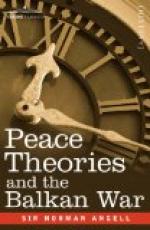Now rulers did not create these things; it was the daily activities of the people, born of their desires and made possible by the circumstances in which they lived, by the trading and the mining and the shipping which they carried on, that made them. But the Balkans have been geographically outside the influence of European industrial and commercial life. The Turk has hardly felt it at all. He has learnt none of the social and moral lessons which interdependence and improved communications have taught the Western European, and it is because he has not learnt these lessons, because he is a soldier and a conqueror, to an extent and completeness that other nations of Europe lost a generation or two since, that the Balkanese are fighting and that war is raging.
But not merely in this larger sense, but in the more immediate, narrower sense, are the fundamental causes of this war economic.
This war arises, as the past wars against the Turkish conqueror have arisen, by the desire of the Christian peoples on whom he lives to shake off this burden. “To live upon their subjects is the Turks’ only means of livelihood,” says one authority. The Turk is an economic parasite, and the economic organism must end of rejecting him.
For the management of society, simple and primitive even as that of the Balkan mountains, needs some effort and work and capacity for administration, or even rudimentary economic life cannot be carried on. And the Turkish system, founded on the sword and nothing else ("the finest soldier in Europe"), cannot give that small modicum, of energy or administrative capacity. The one thing he knows is brute force; but it is not by the strength of his muscles that an engineer runs a machine, but by knowing how. The Turk cannot build a road, or make a bridge, or administer a post office, or found a court of law. And these things are necessary. And he will not let them be done by the Christian, who, because he did not belong to the conquering class, has had to work, and has consequently become the class which possesses whatever capacity for work and administration the country can show, because to do so would be to threaten the Turk’s only trade. If the Turk granted the Christians equal political rights they would inevitably “run the country,” And yet the Turk himself cannot do it; and he will not let others do it, because to do so would be to threaten his supremacy.
And the more the use of force fails, the more, of course, does he resort to it, and that is why many of us who do not believe in force, and desire to see it disappear in the relationship not merely of religious but of political groups, might conceivably welcome this war of the Balkan Christians, in so far as it is an attempt to resist the use of force in those relationships. Of course, I do not try to estimate the “balance of criminality.” Right is not all on one side—it never is. But the broad issue is clear and plain. And only those concerned with the name rather than the thing, with nominal and verbal consistency rather than realities, will see anything paradoxical or contradictory in Pacifist approval of Christian resistance to the use of Turkish force.




